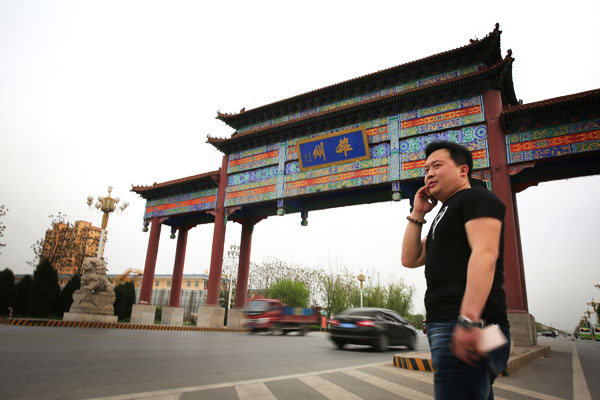
A fisherman from Anxin county tries to catch fish at the lake of Baiyangdian with help from cormorants. (Photo by Leo Chan/For China Daily)
According to Yang, most of the locals now based elsewhere are waiting for further clarity on policies and development plans for the new area. Such policies and plans are being drafted.
Yang said all those keen to set up startups, including himself, should be prudent, and choose only those business fields that are in accordance with the policies of the planned new area.
Xinhua News Agency quoted Chinese Vice-Premier Zhang Gaoli as saying that Xiongan should promote innovation, attract high-tech enterprises and avoid becoming an industrial hub led by traditional industries.
The proposed emphasis appears to have inspired some of the established local entrepreneurs to adapt their development strategies accordingly.
Xu Linghua, chairman of Hebei Taidou Cable Group Co Ltd, said he has started combining his old business with innovation. Taidou Cable is a local private company engaged in the making of cables in Xiongxian, the third county included in the new area.
"My cable-making factories might adapt to the overall planning of the new area," Xu said, adding that he is keen to establish an online platform to exhibit and sell cable products across China.
"Even if my factories get eliminated (as part of the area development), internet-led businesses might be welcome, because cables will be still needed in the development of Xiongan," he said. "They will be needed in buildings and transportation facilities such as subway train systems," Xu said.

A Xinhua report quoted an official with the preparatory committee of Xiongan as saying that high-tech businesses such as 5G communications, biomedicine, artificial intelligence and internet finance might be welcome.
The master plan for the new area development has not yet been finalized.
Companies such as Hebei Hengshan Construction Co Ltd, which is based in the provincial capital Shijiazhuang, about 200 km away from Xiongan, are watching the situation closely.
Xing Shitian, who works with Hengshan, believes no matter how the area will develop, new infrastructure such as buildings is essential. Hengshan may well set up a branch in the area, he said.
"I hope specific policies for the development of Xiongan will be announced as soon as possible. We are well prepared to go there and seek new construction orders," Xing said.
While the private sector and individual entrepreneurs are awaiting policy clarity, State-owned enterprises have received initial support from policymakers.
The State-owned Assets Supervision and Administration Commission of the State Council said on April 14 that central SOEs will be encouraged to locate their newly registered high-tech, new technology and high-end service businesses in the Xiongan New Area.
They "are encouraged to lend strong support to the construction of the zone in areas like energy security, infrastructure, electricity, telecommunications, rail transport, ecological protection, information-based networks and smart cities," it said in a statement.


















































